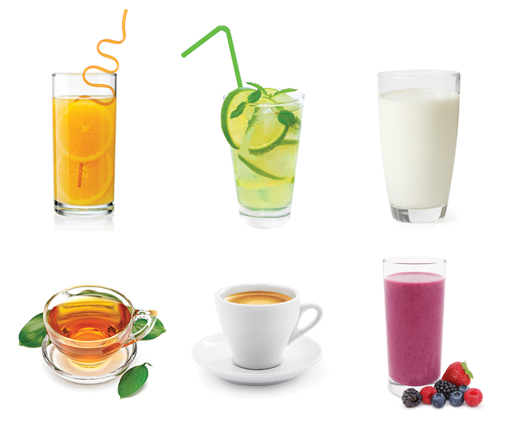4 What should you drink?
Health advice on the types of fluid to drink include water, milk (lower fat varieties if required), sugar-free drinks, tea and coffee (Figure 4). Some drinks such as fruit juice and smoothies contain free sugars. It is recommended that you have no more than 150 ml of these a day (this also contributes to one of your five a day). Alcohol also contributes to fluid intake but you will learn more about that later.
It is always worth considering the energy value of the drinks you have because this contributes to your overall dietary energy for that day. There are calls for a sugar tax on drinks to reduce the incidence of obesity. Looking at food labels of different drinks can be very enlightening. Some drinks that you may have considered healthy can have a lot of naturally occurring or added sugars.
Activity 4 Sugar tax
Read the article Soft Drinks Industry Levy: 12 things you should know [Tip: hold Ctrl and click a link to open it in a new tab. (Hide tip)] (Gov.uk, 2016).
Then note your answers to the following questions.
- Is the sugar tax on drinks a good idea or not?
- What about dental health?
- Which foods affect the health of your teeth and gums?
Click ‘Save’ when you are satisfied with what you have written.
Should you sip or gulp your drinks? Drinking all of your fluids for the day at once may not be the best way of hydrating yourself. The kidneys will eliminate extra fluid at any particular time. Thus, having regular drinks throughout the day is recommended.
Fluid from food also contributes to your daily intake. You may find that you are less thirsty with a more liquid meal compared with a dry meal.
It is possible to have too much fluid. This is called water intoxication and can occur if a large amount of fluid is taken in over a short period of time. In this case, the blood volume increases and dilutes certain electrolytes, especially sodium, causing hyponatremia (normal levels are 135–145 mmol/L). Low extracellular sodium levels force fluid inside cells, making them swell. In the brain this swelling can be dangerous and, in extreme situations, can be fatal. Don’t worry: you would have to drink a lot of fluid in a very short space of time and most people don’t do that.
You have already looked at how much you drink. Now consider the following questions.
- What do you tend to drink?
- What do you think most people drink in the UK?

